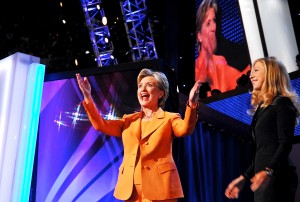Clinton at the DNC: “Barack Obama Is My Candidate”
For all the hoopla about the sometimes-termed “embittered” New York Sen. Hillary Clinton hijacking the Democratic National Convention, the erstwhile presidential candidate embraced Barack Obama during her 25-minute speech at the Pepsi Center on Tuesday night.
For all the hoopla about the sometimes-termed “embittered” New York Sen. Hillary Clinton hijacking the Democratic National Convention, the erstwhile presidential candidate embraced Barack Obama during her 25-minute speech at the Pepsi Center on Tuesday night.
“Barack Obama is my candidate,” said Clinton, to cheers. “And he must be our president.”
Clinton’s speech, coming at 8:45 p.m. Mountain Daylight Time to a
packed the convention hall, was the most anticipated of the evening;
media and guests spilled out into the corridors of the main arena.
“Hillary” and “Obama” signs dotted the floor, while others carried
“Unity” posters, a rhetorical touch in light of Clinton’s message.

“Whether you voted for me, or voted for Barack, the time is now to
unite as a single party with a single purpose. We are on the same team,
and none of us can sit on the sidelines,” said Clinton.
She also indirectly appealed to her most inflexible supporters,
those who say they’ll support Republican John McCain rather than see
Clinton’s one-time combatant take office.
“I want you to ask yourselves: Were you in this campaign just for
me? Or were you in it for that young Marine and others like him,” she
said, referring to a sick soldier she had spoken of earlier in the
speech — a man who had urged Clinton during her own quest to take care
of his friends still in Iraq and Afghanistan before himself.
Clinton, who had been touted as a potential vice presidential pick, also praised Delaware Sen. Joe Biden, who has curried favor with some high-profile feminists for his work to stop violence against women.
But while Clinton’s prime-time speech echoed Obama’s call for change
in the White House, the senator nudged the presumptive nominee to
remember the work that had come before them.
Clinton highlighted the efforts of suffragettes in Seneca Falls,
N.Y., who gathered in 1848 for the first convention on women’s rights
in U.S. history. And she gave tribute to abolitionist Harriett Tubman,
whose message to “keep going” should remind Americans that “we’re not
big on quitting.” Both allusions garnered wild applause.
Clinton also honored her husband Bill Clinton’s presidency, saying,
“When Barack Obama is in the White House, he’ll revitalize our economy,
defend the working people of America, and meet the global challenges of
our time. Democrats know how to do this. As I recall, President Clinton
and the Democrats did it before. And President Obama and the Democrats
will do it again.”
Though the theme of Tuesday’s convention proceedings was “Renewing
America’s Promise,” Clinton spoke very broadly on ending the war,
improving the economy and fixing health care, and opted mainly to plug
for Obama and a new White House regime.
Even so, Clinton, 60, has an impressive history of working for middle-class Americans. Here’s a brief look at her past:
Born in Chicago, Ill, in 1947, she attended Wellesley College in
Massachusetts, where she pledged herself to the Democratic Party after
a brief stint as a Republican. She later received her J.D. degree from
Yale Law School and worked as a staff attorney for the Children’s
Defense Fund.
In 1978, Clinton became First Lady of Arkansas when her husband was
elected as the state’s governor. She solidified her reputation as an
outspoken and involved First Lady, chairing the state’s Rural Health
Advisory Committee as well as the Educational Standards Committee,
while at the same time becoming the first woman to make full partner at
the Rose Law Firm.
When Bill Clinton won the presidency in 1992, Hillary Clinton
spearheaded the Task Force on National Health Care Reform, which failed
to instigate major policy changes. She later initiated the State
Children’s Health Insurance Program, a federal project to provide
underprivileged children with state health care. She launched, and won,
a U.S. Senate seat in 2000, and won re-election in 2006.
Clinton announced her run for the presidency in 2007. As the first
female contender to come close to securing the presidential nomination,
her candidacy opened a dialogue on sexism in the media and in politics.
During her campaign, Clinton focused on working families and education,
calling for relief for the nation’s housing crisis and more teachers in
hard-to-serve areas.
